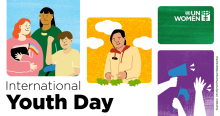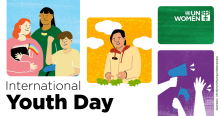Ageism is an issue of inequality, discrimination, and injustice. Without tackling it, we will not achieve gender equality by 2030. Ageism impacts everyone—young and old. Prejudices surrounding age are widespread and unchallenged—in our attitudes, beliefs, policies, and societies—and create a formidable barrier to young women’s full participation in their communities. Negative stereotypes can exacerbate harmful norms and stigmas that prevent young women’s full participation in their communities across the world. It is essential that we shift these destructive narratives and encourage and facilitate the leadership and full engagement of young women in decision-making, so that the shape of the future is informed by their views and knowledge.
Statement: Intergenerational solidarity – Creating a world for all ages
A radical shift is needed in our collective responses to young people and to the arrangements that either exclude or support them. We need an approach that is intersectional, gender-responsive, and which recognizes and acknowledges the long-term impacts of ageism, to ensure that no one is left behind.
To achieve intergenerational solidarity requires us to think more deeply about our commitments to dignity and collective freedom, in solidarity within feminist movements. We need practical changes that shift patterns of exclusion to new patterns of engagement. These could include special measures and quotas for representation, the integration of a gender perspective into all youth and ageing-related policies and programmes, and the strengthening of the knowledge base on the impacts of discrimination arising out of gender–age intersections. To break through to a more positive future, we need to act boldly, hand in hand with young leaders, and commit to sustainable solutions.
We call on all stakeholders to act in solidarity to adopt transformational leadership practices that combat ageism and to lead change with youth every step of the way. We must follow the evidence that highlights best practices in these efforts. We must strengthen the existing body of research so as to fully capture the breadth of ageism. And we must go forward in intergenerational solidarity and unity with the feminist movement, to fulfil the promise of the 2030 Agenda for all.
Visit the UN website for more information on International Youth Day.

